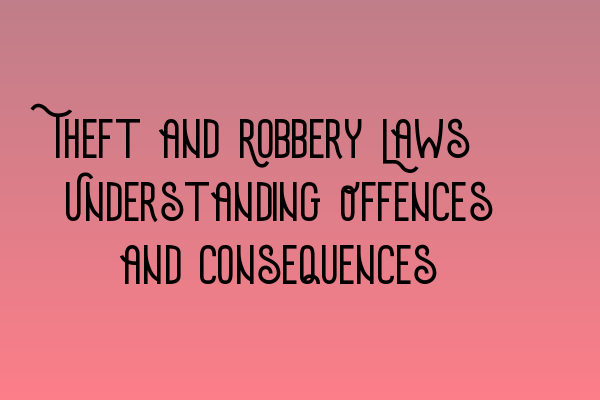Theft and Robbery Laws: Understanding Offences and Consequences
As criminal solicitors at SQE Criminal Law & Practice Law UK, we understand the importance of knowing and comprehending theft and robbery laws. These offences are taken seriously in the UK legal system and can have severe consequences for individuals who engage in such activities.
In this article, we will provide a comprehensive overview of theft and robbery laws, and delve into the potential consequences of committing these offences. It is crucial to familiarize yourself with these laws to ensure that you stay out of legal trouble and uphold the ethical standards set by society.
Theft Law
In English law, theft is defined as the dishonest appropriation of property belonging to another person, with the intention to permanently deprive the owner of that property. This offence is taken seriously and can lead to significant penalties, including custodial sentences.
When it comes to theft, several key elements need to be present for an individual to be convicted. These elements include:
- Appropriation: The act of assuming control over another person’s property without their consent.
- Dishonesty: The individual’s actions must be considered dishonest by the standards of reasonable, honest people.
- Property: The item being taken must be considered property and have some value.
- Belonging to another: The property must belong to someone other than the individual committing the theft.
- Intention to permanently deprive: The individual must have the intention to keep the property for themselves and permanently deprive the rightful owner of its possession and use.
Understanding the elements of theft is crucial to building a defense or to establish guilt in a case. If you are preparing for the SQE 1 examination, we recommend practicing exam questions related to theft and familiarizing yourself with various scenarios.
For SQE 1 practice exam questions, click here: SQE 1 Practice Exam Questions
Robbery Law
Robbery is a more serious offence compared to theft and involves the use or threat of force, causing the victim to fear immediate harm. The act of robbery includes the elements of theft, as well as the additional use of force or the fear of force.
Robbery is considered a grave criminal offence, carrying severe penalties. If convicted of robbery, an individual can face lengthy custodial sentences, which can have a significant impact on their future.
To prove the offence of robbery, the prosecution must establish the following:
- Dishonest appropriation of property.
- Use or threat of force.
- The force used or threatened is immediately before or at the time of the theft.
- The property is taken with the intention to permanently deprive the owner of it.
It is essential for aspiring criminal law practitioners to thoroughly understand the elements and consequences of robbery. To enhance your knowledge further, we recommend taking SQE 2 preparation courses that cover robbery laws extensively.
For SQE 2 preparation courses, click here: SQE 2 Preparation Courses
Consequences of Theft and Robbery
The consequences of committing theft or robbery can be severe and life-altering. The penalties imposed by the court depend on various factors, such as the value of the stolen property, the presence of aggravating factors (e.g., use of violence), and the defendant’s previous criminal record.
For theft offences, the penalties can range from fines to custodial sentences, with more serious cases attracting lengthier incarcerations. On the other hand, robbery carries a higher degree of punishment due to the additional element of force involved. Convictions for robbery often result in significant prison terms.
It is crucial to remember that being charged with theft or robbery can have long-lasting effects on various aspects of your life, including employment prospects, personal relationships, and reputation. Therefore, it is highly advisable to consult with an experienced criminal solicitor to understand your legal rights and to receive appropriate legal representation.
If you are preparing for the SQE 1 examination, we recommend practicing mocks quiz on FLK1 and FLK2 related to theft and robbery laws.
For SQE 1 practice mocks FLK1 FLK2, click here: SQE 1 Practice Mocks FLK1 FLK2
It is important to stay up-to-date with the latest SRA SQE exam dates. Check their website for the most recent information regarding examination schedules.
For SRA SQE exam dates, click here: SRA SQE Exam Dates
By understanding theft and robbery laws, their elements, and the potential consequences, you can make informed decisions and stay on the right side of the law. If you require legal assistance or advice regarding theft or robbery, our team of expert solicitors at SQE Criminal Law & Practice Law UK is here to help.
Contact us today to receive professional legal guidance and representation to navigate the complexities of theft and robbery laws.
